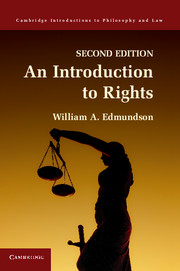Book contents
- Frontmatter
- Contents
- Preface to the First Edition
- A Note on the Second Edition
- A Note on Citation Form
- List of Tables
- Part One The First Expansionary Era
- Part Two The Second Expansionary Era
- 6 The Universal Declaration, and a Revolt Against Utilitarianism
- 7 The Nature of Rights
- 8 A Right to Do Wrong? Two Conceptions of Moral Rights
- 9 The Pressure of Consequentialism
- 10 What Is Interference?
- 11 The Future of Rights
- 12 Conclusion
- Bibliographical Notes
- References
- Index
7 - The Nature of Rights
“Choice” Theory and “Interest” Theory
from Part Two - The Second Expansionary Era
Published online by Cambridge University Press: 05 June 2012
- Frontmatter
- Contents
- Preface to the First Edition
- A Note on the Second Edition
- A Note on Citation Form
- List of Tables
- Part One The First Expansionary Era
- Part Two The Second Expansionary Era
- 6 The Universal Declaration, and a Revolt Against Utilitarianism
- 7 The Nature of Rights
- 8 A Right to Do Wrong? Two Conceptions of Moral Rights
- 9 The Pressure of Consequentialism
- 10 What Is Interference?
- 11 The Future of Rights
- 12 Conclusion
- Bibliographical Notes
- References
- Index
Summary
In our thinking about rights, we have to try to avoid confusing questions of two different kinds, one of which has been called “conceptual,” and the other “ justificatory.” Conceptual questions are questions about what rights are, what their makeup is, and what follows from an assertion that X has a right of such-and-such a description. Hohfeld’s work is an example of conceptual inquiry in its purest form. Justificatory questions, in contrast, focus on the grounds for, and reasons behind, the distribution of rights. Granted that a right is a certain kind of thing, why should we think that any exist? What grounds could there be for assigning rights? What purposes do rights serve, and could we do without them?
The distinction between the conceptual and the justificatory is not razor-sharp, and often the two exert influence on each other. Our conceptual picture of what a right is has been shaped by factors that involve judging what a right would have to look like to be worth having. Making this kind of judgment goes beyond simply registering what might or might not sound “odd” to our ears as a matter of ordinary usage. If, for example, a right were a mere Hohfeldian permission to φ, it might seem to be a trivial thing unless it were coupled with a permission not to φ. If we want a term, we could call this simple Hohfeldian molecule an option, or bilateral liberty, though sometimes I may simply call it a permission, with the understanding that it is “bilateral.” Take this thought to the next step: What justifies us in thinking that anyone has a permission to do anything? Recall that Godwin denied this, for a permission in this sense is precisely what he disparaged as an “active” right. For Godwin, we have a duty to perform that act which will bring about the greatest good, and a duty to omit all other acts, and thus we never have a permission (in the “bilateral” sense). A dispute with Godwin on this issue will not be a merely conceptual one, because its justificatory aspects will ultimately influence the conceptual positions of the parties. People are rarely satisfied merely to note conceptual subtleties; even Hohfeld was partial to the claim-right as the only right properly so-called.
- Type
- Chapter
- Information
- An Introduction to Rights , pp. 96 - 107Publisher: Cambridge University PressPrint publication year: 2012

